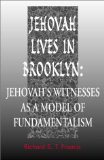My dear friend (and fellow exJW) Richard Shining Thunder Francis has a radio show called “High Spirits” and I’m sending out a call for people to call in with questions, since questions and calls are the center and theme of the show.
Our goal is to present a happy, positive view of spirituality, and to encourage its practical applications. To do this, each week, we will discuss metaphysics, psychology, philosophy, cults and odd beliefs, dogma, history, kabbalism (generic), gnosticism (generic), sufism (generic), and other fascinating forms of the Way of compassion. Love, or compassion will, of course, be a theme, and we shall look together into the bright mysteries of agapology (the psychology of Love). Take a break from your frenzied week. Have a warm cup of coffee or cold drink, sit back, and listen to the most important, and most captivating, subjects in the universe!
Listen to “High Spirits” Online
at 1530AM WCKY
Cincinnati
Sat 8 PM
Call in from 8-9 PM EST
Local: 749-1530
Out of area: 877-345-3779
You do not have to receive the station over radio to call. You can listen online, and you will be able to hear the show on the telephone as well. You can also help other people by making this call. Don’t worry; you will be on the air for only a few seconds to ask your question. Just have it ready to go and call 877-345-3779, after 8 pm (it’s free). You can ask about the “new age,” fundamentalism, religion, metaphysics, spirituality, philosophy, psychology, parapsychology, God, nature, cults, or anything related to any of these.
Teacher, author, psychospiritual advisor, life-design consultant, and practicing mystic, Richard’s point of view is centered on love mysticism. He is the founder of agapology, the science of love-psychology, spokesperson for the Universal Love Movement (not a religion, but a Way) which challenges society to live by the principles of compassion, acceptance, and tolerance. He is not a “guru.”
I called in about two weeks ago, and the discussion really helped me to refocus in a more positive direction.
His sites:
Love Ministries
Blog
Richard is one of the most lucid, giving, and compassionate people I’ve ever known.
He has written several books, many of which are available for download.
My favorite is Journey to the Center of the Soul: Mysticism Made Simple, but I first stumbled across his work while searching for good books on Jehovah’s Witnesses. The JW books are very helpful for understanding how and why the organization of Jehovah’s Witnesses can be so psychologically and spiritually destructive. When I read these two books, everything that I had sensed and felt really clicked into place. His style is quite different from my own, and his way of framing things gave me a new kind of conceptual and emotional “niche” in a heart/mind space that had been empty. I’ve been recommending the JW books on my site for some time:
Jehovah Lives in Brooklyn – Richard S. T. Francis
An extremely helpful book for ex-JWs (and for those who love them) that succeeds in capturing the thought patterns, assumptions, mindset, destructive consequences, spiritual distortions, and psychosocial dynamics of the “organization.” A very readable narrative of such issues as personality dismantling, satanic projection, sense of uniqueness, persecution, conformity and masks, and censorship. “Thus, in cases I have witnessed personally, parents have totally rejected and turned their backs on wayward children, brothers have become the fiercest of enemies, and lovers are separated with a ferocity and mutual hatred. Every form of sentimentality is despised as a weakness when it comes to the question of loyalty to Jehovah’s organization. Every human being is disposable. …This is an underlying flaw in much of fundamentalism, including JWs: ideas and concepts are more sacred even than human life. It is due to this distortion that JWs refuse blood transfusions even to save the lives of their children–a teaching for which they have become monsterously notorious.” (p.73).
Jehovah Good-Bye: The New Theism of Love – Richard S. T. Francis
Ex-JW Francis moves from criticism to a constructive analysis of what he calls the “New Theist,” who is reconnecting to the agapic god of love and forgiveness. “The New Theist has arisen in specific response to the intellectual and spiritual starvation so often promoted by traditional religion. Far too often, religion, whose job it is to feed the masses, wrenches from their hands the tiniest morsels of substantial spiritual food, and tries to replace them with the non-nutritive ‘straw’ of organizationalism and dogma, doctrine and administration. Worse, some groups are monomaniacally obsessed with only money, and religion is only a front” (p.11). ” “The God of revealed by Jesus was no primitive anthropomorphism, no historical product of evolution from the proto-Jehovac images of the old god. This God did not dribble out forgiveness in parsimonious, unwilling, reticent microparticles; this God deluged and immersed his children in purest Love, and was eager and delighted to forgive. And according to grace, he did not forgive becuase of his children’s attitudes or behaviors; he forgave because of the quality of his love” (p. xix).



